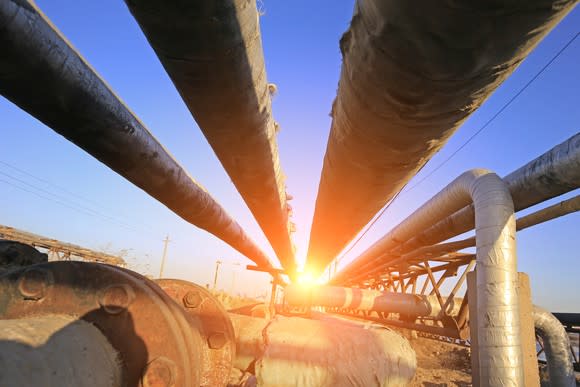Kinder Morgan Inc Earnings Preview: What to Watch
Kinder Morgan (NYSE: KMI) has had an up-and-down year. The pipeline giant started 2018 off with a bang by reporting strong first-quarter results, which enabled it to raise its dividend 60% versus last year's level as well as buy back another $250 million in stock. However, it also failed to reach an agreement that protected its interests to expand the Trans Mountain Pipeline, which resulted in the company handing over the controversial system to the government of Canada.
That sale left several questions unanswered, which investors hope the company will address this week when it announces second-quarter results. Here's what to keep an eye on in that report.

Image source: Getty Images.
The post-Trans Mountain strategy
The Trans Mountain Pipeline expansion project would have been a significant growth driver for Kinder Morgan. The $5.7 billion investment represented nearly half of the company's $12 billion capital project backlog as well as around half of the $1.6 billion of incremental EBITDA it expected these expansions to produce in the coming years, which would have boosted EBITDA 23% from 2017's level.
However, with the centerpiece of its growth strategy going out the door, Kinder Morgan needs to determine its new way forward. While the company has already started work on developing new projects that will help offset this lost growth potential, including the recently unveiled Permian Highway Pipeline, three crucial questions remain unanswered:
What will happen to Kinder Morgan Canada Limited (TSX: KML)?
Will the company make any changes to its plan to send more money to shareholders?
Are there any other big moves in store?
Will it stay, or will it go?
Kinder Morgan currently owns 70% of Kinder Morgan Canada, which it created specifically to help fund the construction of the Trans Mountain expansion. While that entity owns several other assets in Canada, including some pipelines and storage terminals, Trans Mountain was its crown jewel. With that pipeline changing hands, Kinder Morgan needs to determine whether its watered-down Canadian subsidy should remain public.
On the one hand, keeping it public has its benefits, since the company could use that entity to drive growth in Canada by acquiring other midstream assets in the country. However, taking it private could also make sense, because the company would eliminate some extra reporting costs while taking full control over the entity's assets, including its huge cash balance. Ideally, Kinder Morgan will have an update on what it plans to do with this entity when it reports results.
Is the plan still the plan?
Last July, Kinder Morgan announced plans to begin returning more cash to shareholders starting in 2018. At the time, the company said it would raise the dividend 60% in 2018 and another 25% in both 2019 and 2020. Further, the company authorized a $2 billion share buyback program, which at the time was enough money to reduce its outstanding share count by 5%.
Kinder Morgan has already made good on some of these promises by increasing the dividend 60% earlier this year and repurchasing $500 million of stock through the end of the first quarter. However, with the sale of Trans Mountain, it's unclear if the company will stick with this plan. While Kinder Morgan reiterated its intention to increase the dividend by 25% in 2019 and 2020, it pressed pause on the share repurchase program at the end of the first quarter. The hope is that the company will clear up any uncertainty by providing more details on its capital return strategy.

Image source: Getty Images.
Is it time to ditch carbon?
Some analysts believe that the sale of the Trans Mountain Pipeline is a sign that Kinder Morgan is more open to transformational moves, including selling its carbon dioxide business, which produces and transports carbon dioxide to legacy oil fields in Texas, where it's injected to increase production. On the one hand, this business supplies 11% of Kinder Morgan's earnings and generates lucrative returns. However, it's also highly sensitive to oil prices, which caused it to drag on profitability during the recent downturn.
While Kinder Morgan believes the good outweighs the bad, analysts have been calling on the company to jettison this business for years. Because of that, investors should keep an eye on whether Kinder Morgan plans to explore strategic alternatives for this segment, which could be just the catalyst needed to get the company's stock out of its current doldrums.
Look for the picture to come into focus
With the pending sale of the Trans Mountain Pipeline, Kinder Morgan investors aren't clear what steps the company will take next. That's why they're hoping it will provide that clarity when it reports results this week. Doing so would help lift the weight of uncertainty that remains a key reason why Kinder Morgan shares trade at a bottom-of-the-barrel valuation versus its peers.
More From The Motley Fool
Matthew DiLallo owns shares of Kinder Morgan. The Motley Fool owns shares of and recommends Kinder Morgan. The Motley Fool has a disclosure policy.
